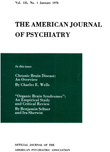BRAIN DAMAGE FROM CHRONIC ALCOHOLISM: THE DIAGNOSIS OF INTERMEDIATE STAGE OF ALCOHOLIC BRAIN DISEASE
Abstract
This study indicates the presence of a syndrome of an intermediate stage of alcoholic brain disease, midway between the acute and the chronic stages. In the intermediate stage the EEG changes, the clinical findings and the psychological test data lead to the diagnosis of incipient brain damage; the presence of cerebral atrophy can be confirmed by pneumogram.
The study of 227 cases showed 98 in the acute stage, 81 in the intermediate stage, and 48 in the chronic stage. In the 81 patients in the intermediate stage, 64 (79%) had abnormal EEG records, with organic brain damage indicated in 9 cases by psychological tests or pneumograms or both.
The implications for treatment are summarized: 1. The persistence of abnormal EEG records after the acute episode emphasizes the need for comprehensive medical treatment of the organic factors, before the brain damage becomes irreversible. These organic factors are often erroneously considered to indicate personality disorders, with consequent ineffective therapeutic measures. 2. The patient under institutional or other supervisory control must stop all use of alcohol. 3. After improvement of the organic features, the patient is ready to begin individual and group psychotherapy and a general rehabilitative program, including the help of Alcoholics Anonymous and similar organizations. 4. The relatives must be made to understand the seriousness of the disease, and their cooperation enlisted in the treatment program. 5. The problem of alcoholic addiction must eventually be attacked at a national level with steps to insure early detection of addiction and organic brain disease, and with a broad program of control of drinking and of rehabilitation.
Access content
To read the fulltext, please use one of the options below to sign in or purchase access.- Personal login
- Institutional Login
- Sign in via OpenAthens
- Register for access
-
Please login/register if you wish to pair your device and check access availability.
Not a subscriber?
PsychiatryOnline subscription options offer access to the DSM-5 library, books, journals, CME, and patient resources. This all-in-one virtual library provides psychiatrists and mental health professionals with key resources for diagnosis, treatment, research, and professional development.
Need more help? PsychiatryOnline Customer Service may be reached by emailing [email protected] or by calling 800-368-5777 (in the U.S.) or 703-907-7322 (outside the U.S.).



